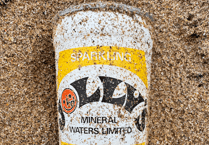So that’s it. Another festive season over. Here we are, back to the grindstone, and staring Blue Monday – allegedly the most depressing day of the year - in the face.
On the long pilgrimage north to see my folks over New Year, I couldn’t help noticing how short the days seem 350 miles north-east of Cornwall, especially under a lugubrious raincloud. Headlights were on at 3.30pm, and our thoughts were shifting into evening mode. It was practically bedtime, after all.
It drove home how lucky we are to live in the South West, where daylight lingers a little longer – although even here, we are living in a kind of primeval hibernation mode.
The school routine is back with a vengeance, and after two weeks of emerging mid-morning, Daughter is struggling with the brutal wake-up call at 7am. I’m up first and in full dictator mode, barking orders while she shuffles around like a snail on go-slow.
Deep down, I’m with her 100%. What sensible person wants to haul themselves out of bed when all the signs are that it’s still night-time?
Lack of daylight was just one factor in the calculations that placed Blue Monday on the third Monday in January – this year, it’s the 15th. Other considerations included post-Christmas debt combined with the distance from payday, and the weather – which, let’s face it, has been spectacularly grim at times.
Proven phenomenon, or marketing ploy? Once a ground-breaking song by New Order, the term Blue Monday was coined in 2005 by a travel company who asked a psychologist to predict the day when people would be most likely to book a summer holiday.
It stuck, but has been widely panned by mental health specialists, who are quick to point out that depression can last longer than one named day and can’t always be fixed by a cheap break in the sun, and that to imply as much trivialises a very real and serious issue.
Nevertheless, these short, sombre, soggy days can be a slog. Even the NHS recognises Seasonal Affective Disorder (SAD), citing the main theory as a lack of sunlight preventing a part of the brain called the hypothalamus working properly. The result: more sleepy hormones, fewer happy hormones and circadian rhythms all over the shop.
What to do? The internet isn’t short of suggestions, from dress-down days at work (darling: for homeworkers, every day is a dress-down day) to simply making sure that you get out for a walk, however short, during daylight hours.
Eat healthy food. Sing upbeat songs. Spend time with loved ones, doing something you can look forward to.
Above all, remember: for all the title and the theory, Blue Monday is just another day, like all the others. Try not to let it get you down.





Comments
This article has no comments yet. Be the first to leave a comment.